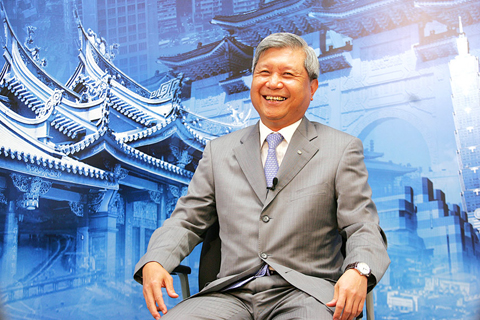Acer Inc (宏碁), the world’s third-largest PC maker, will comply with a Chinese government order for all computers sold in the country to include anti-pornography software, spokesman Henry Wang (汪島雄) said.
“The company has noted the regulations and we will meet them,” Wang said by phone yesterday.
He declined to say if the Taipei-based company had already installed the “Green Dam-Youth Escort” software on its products in China.

PHOTO: BLOOMBERG NEWS
All personal computers sold in China from today were to have to include the software as part of government efforts to curb access to pornographic content on the Internet, a May 19 statement by China’s Ministry of Industry and Information Technology said.
However, later yesterday China’s Xinhua new agency reported that the implementation of the controversial policy would be delayed.
Hewlett-Packard Co (HP), the world’s largest PC maker, is seeking additional information and watching developments on the requirements, spokeswoman Pamela Bonney said on Monday.
Dell Inc, the second largest, will “continue to monitor” the situation, spokesman Jess Blackburn said.
Both declined to say whether their companies would adopt the software.
Meanwhile, a California company that says its software was illegally used in Beijing’s new Internet filter threatened unspecified legal action.
Solid Oak Software Inc of Santa Barbara said it had written to Dell, HP and other producers advising them not to install the software on the grounds that it contained illegally obtained intellectual property.
Solid Oak said it was appointing lawyers to represent it in China and would be “moving forward legally” today, company spokeswoman Jenna DiPasquale said in an e-mail.
“I cannot say at this time what specific legal action we plan to take,” DiPasquale said.
US trade officials, industry and free-speech groups have appealed to Beijing to revoke its order, which requires suppliers to pre-install the software or include it on a disk with each PC made for sale in China.
Washington said the order, issued abruptly in May, might violate Beijing’s WTO free-trade pledges. American officials have cited warnings by computer experts that the software could cause security problems for users.
The US embassy in Beijing did not immediately respond to requests for information on the status of talks with Chinese officials.
Industry groups have received no response to a letter sent last week by 22 US, European and Japanese groups to Chinese Premier Wen Jiabao (溫家寶), appealing to him to scrap the order, said one of the signers, Joerg Wuttke, president of the EU Chamber of Commerce in China.
“We hope we receive feedback,” Wuttke said. “We also hope this decision can be postponed, because there are so many uncertainties in connection with the software.”

SEEKING CLARITY: Washington should not adopt measures that create uncertainties for ‘existing semiconductor investments,’ TSMC said referring to its US$165 billion in the US Taiwan Semiconductor Manufacturing Co (TSMC, 台積電) told the US that any future tariffs on Taiwanese semiconductors could reduce demand for chips and derail its pledge to increase its investment in Arizona. “New import restrictions could jeopardize current US leadership in the competitive technology industry and create uncertainties for many committed semiconductor capital projects in the US, including TSMC Arizona’s significant investment plan in Phoenix,” the chipmaker wrote in a letter to the US Department of Commerce. TSMC issued the warning in response to a solicitation for comments by the department on a possible tariff on semiconductor imports by US President Donald Trump’s

The government has launched a three-pronged strategy to attract local and international talent, aiming to position Taiwan as a new global hub following Nvidia Corp’s announcement that it has chosen Taipei as the site of its Taiwan headquarters. Nvidia cofounder and CEO Jensen Huang (黃仁勳) on Monday last week announced during his keynote speech at the Computex trade show in Taipei that the Nvidia Constellation, the company’s planned Taiwan headquarters, would be located in the Beitou-Shilin Technology Park (北投士林科技園區) in Taipei. Huang’s decision to establish a base in Taiwan is “primarily due to Taiwan’s talent pool and its strength in the semiconductor

An earnings report from semiconductor giant and artificial intelligence (AI) bellwether Nvidia Corp takes center stage for Wall Street this week, as stocks hit a speed bump of worries over US federal deficits driving up Treasury yields. US equities pulled back last week after a torrid rally, as investors turned their attention to tax and spending legislation poised to swell the US government’s US$36 trillion in debt. Long-dated US Treasury yields rose amid the fiscal worries, with the 30-year yield topping 5 percent and hitting its highest level since late 2023. Stocks were dealt another blow on Friday when US President Donald

UNCERTAINTY: Investors remain worried that trade negotiations with Washington could go poorly, given Trump’s inconsistency on tariffs in his second term, experts said The consumer confidence index this month fell for a ninth consecutive month to its lowest level in 13 months, as global trade uncertainties and tariff risks cloud Taiwan’s economic outlook, a survey released yesterday by National Central University found. The biggest decline came from the timing for stock investments, which plunged 11.82 points to 26.82, underscoring bleak investor confidence, it said. “Although the TAIEX reclaimed the 21,000-point mark after the US and China agreed to bury the hatchet for 90 days, investors remain worried that the situation would turn sour later,” said Dachrahn Wu (吳大任), director of the university’s Research Center for